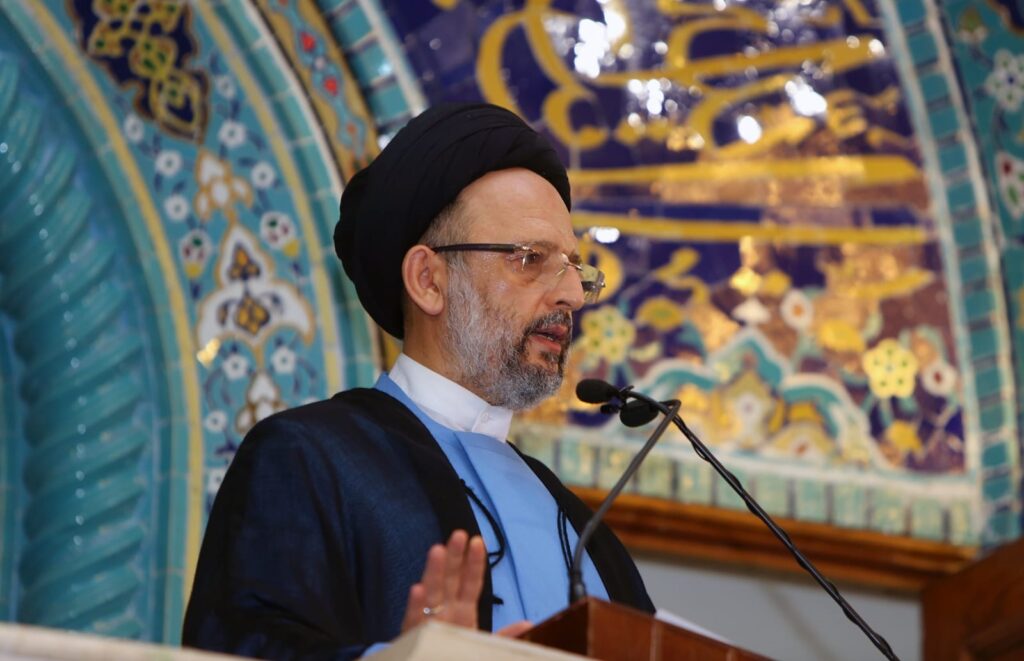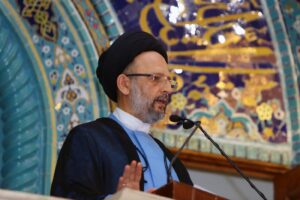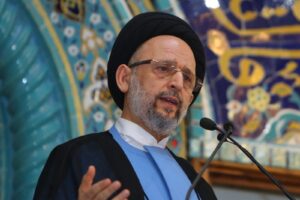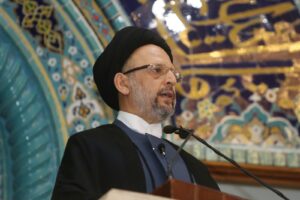In The Name of Allah, The Compassionate, The Merciful. Fighting in Islam: when and how
His Eminence, Sayyed Ali Fadlallah, delivered the two Friday prayer sermons at the Imamain Al-Hassanain Mosque, Shaa’ban 20, 1445 /March 1, 2024. Several prominent religious scholars, dignitaries, and hundreds of believers attended the Jumu’a prayer. Following is a summary of the sermons.
The First Sermon
Allah, the Most Exalted, says in His Glorious Book:“Fight in the cause of Allah those who fight you but do not transgress. Indeed, Allah does not like the aggressors.” (Quran 2:190) Allah, The Most Exalted speaks the Truth
Islam came to promote the language of peace in life, as it called for entering into peace completely. Allah, the Most Exalted, endearingly associated peace with His beautiful names, saying: “He is Allah, there is no deity except Him, the Sovereign, the Pure, the Perfection, the Bestower of Peace.” The paradise that believers yearn for is called Dar as-Salam (the Abode of Peace) with their Lord.
The greeting of peace is emphasized in the life of a Muslim, both in this world and as a salutation for the inhabitants of paradise. As stated in the Quran: “Their call therein will be, ‘Exalted are You, O Allah,’ and their greeting therein will be, ‘Peace.'” (Quran 14:10) This is also reflected in the concluding words of a believer’s prayer, reaffirming that a true believer does not seek war, as it is not the ultimate goal in life.
The verse that we recited earlier sets clear boundaries for war and underscores the ethical considerations that must govern combat. It points out that fighting should be for the sake of Allah, emphasizing the importance of aligning with the purpose that Allah intends for life – the establishment of truth and justice. Islam rejects warfare for personal gain, revenge, or territorial expansion and even for spreading the true religion. It explicitly states, “There is no compulsion in religion.”
The Quran specifies the circumstances under which fighting is permitted, such as self-defense against oppression and the expulsion of people from their homes unjustly. Those who resist such oppression and occupation are granted the right, or even the duty, to fight back to reclaim their land. Permission [to fight] has been given to those who are being fought because they were wronged, and indeed Allah is competent to give them victory. Those who have been evicted from their homes without right…”
The Hadiths further emphasize the honorable status of those who die in such struggles, considering them as martyrs. Prophet Muhammad (p.) said, “Whoever is killed unjustly is a martyr,” and “Whoever dies defending his land, wealth, and honor is a martyr.”
The second verse, which encourages fighting and mobilizes everyone capable to initiate it, states: “Why do you not fight in the cause of Allah for the oppressed among men, women, and children who say, ‘Our Lord, take us out of this city of oppressive people and appoint for us from Yourself a protector and appoint for us from Yourself a helper.’?” In this verse, Allah calls upon those capable of fighting to intervene and lift the oppression from men, women, and children who are unable to defend themselves, relying on Allah for assistance. Those who fail will be held accountable before Allah.
The third verse urges fighting until there is no more oppression, and the entire religion belongs to Allah. The Messenger of Allah (p.) did not fight to make people enter into the religion. Rather, he fought against the oppressors of Quraysh who prevented him from conveying his message, causing him physical and psychological harm aiming to obstruct him from completing his mission. They conspired against him, plotted to kill him, and sought to expel him from his land. They tortured his companions and waged wars against him.
All of this compelled him to fight back and weaken them economically until the victory from Allah came, and people entered into the religion of Allah in multitudes.
The fourth verse pertains to fighting those who breach covenants and agreements. Prophet Muhammad (p.) fought against Jewish tribes who violated agreements, such as Banu Quraiza, Banu Nadir, and Banu Qainuqa.
The last verse emphasizes the imposition of internal peace when one group of Muslims aggresses against another, and they do not respond to calls for reconciliation. Allah instructs believers that if two factions among them engage in conflict, efforts should be made to reconcile them. If one faction persists in aggression against the other, then the believers are commanded to fight the aggressive party until they return to the command of Allah.
The verse underscores that the fighting should be directed specifically towards the belligerents and aggressors: “Fight in the way of Allah those who fight against you but do not transgress.” This means that peaceful individuals who do not bear arms and do not pose a threat to others should not be targeted.
The Quran also highlights that Allah does not forbid dealing justly and kindly with those who do not fight against Muslims in matters of religion or drive them out of their homes. Believers are encouraged to uphold justice and fairness towards those who live peacefully alongside them.
This consistent message in the Quran is also reflected in the teachings of Prophet Muhammad (p.). When preparing for battle, he would instruct his companions not to harm non-combatants, women, children, the elderly, or the wounded. This ethical framework ensured that wars were conducted with a focus on justice and avoiding harm to innocent lives.
Dear loved ones: We are in great need of reinforcing these concepts to respond to all those who perceive Islam as a religion of warfare, where fighting is considered a principle and rule, and peace is an exception. However, the reality is different. Islam came to strengthen in humans the love for life. It calls upon them to preserve it, avoiding harm. Nevertheless, it does not accept a life of subjugation and refuses to tolerate the suffering of the oppressed, remaining silent while other Muslims cry for help. It does not tolerate the suppression of freedom and security of those living under occupation. If all of this occurs, then one must engage in the battle with strength and determination, convinced of one of the two virtues: either victory or martyrdom.
.
.
The second sermon
Worshippers of Allah, I advise you and advise myself “O servants of Allah, I advise you and myself to be diligent in the last days of this blessed month, the month of Sha’ban, to seek from the source of the Commander of the Faithful (a.s.) by reading the supplications of Munajat Shaa’banyah. These supplications overflow with meanings of love for Allah, hope for His mercy, and drawing closer to Him. In it, he says: ‘My God, whoever adheres to You is illuminated, and whoever seeks refuge in You is saved. I have found solace in You, O my God, so do not disappoint my hope in Your mercy, and do not veer me away from Your kindness… My God, if my sins have brought me down before You, forgive me with the grace of relying on You. If my transgressions have stripped me of the nobilities of Your kindness, surely certainty in Your benevolence has awakened me. My God, I ask from You, and to You, I supplicate, and I seek and ask You to make me among those who maintain Your remembrance, You, and never underestimate Your command…'”
Dear loved ones, we are in great need of these spiritual and faith-filled inspirations that bring us closer to Allah, remove barriers between us and Him, and enable us to face the challenges that we can only overcome through Him.
In Gaza, the Israeli enemy has adopted a new policy of starvation by preventing essential supplies from reaching the people. Hundreds of trucks are waiting at the crossings under the pretext of inspection, leading to gruesome massacres, as witnessed in yesterday’s tragedy where people eagerly awaited the arrival of the relief convoy. Despite international condemnation, these atrocities continue without alleviating the suffering of the Palestinian people.
Despite the challenges and sufferings, the Palestinian people persist in their resistance against the enemy showcasing daily acts of heroism and sacrifice. Meanwhile, the ongoing negotiations for a ceasefire, emphasizing the need for Arab and Islamic nations to support the Palestinian people and exert pressure on the Zionist entity to end its crimes continue …
In this critical time, we reiterate our call for Arab and Islamic countries to stand in solidarity with the Palestinian people, supporting their position in ongoing negotiations and using all available means of pressure on the Zionist entity and its supporters. This is crucial to prevent further atrocities and achieve a lasting ceasefire that ends the suffering of the Palestinian people. And at the same time, we renew our call to the Arab and Islamic nations and all free people around the world to continue supporting the Palestinian people and raise their voices to expose the practices and crimes of this entity through demonstrations, media channels, social media, or legal means. We urge them to pressure their governments to take fair stances towards the Palestinian people, similar to the positions adopted by many nations.
On this level, we see the significance of the recent incident involving the American soldier in front of the enemy’s embassy in America. His approach, which he deemed appropriate to express his condemnation of his country’s policy in supporting the Zionist entity with funds, weapons, and political and legal support for committing massacres against the Palestinian people, reflects the sentiments of a growing segment within the United States. This segment is raising its voice in solidarity with the Palestinian people, and we anticipate further repercussions across diverse American communities.
We will rely on the increasing awareness of the world’s populations, which have emerged from under the influence of misleading media practices employed by the Zionist enemy. Through these practices, the enemy aimed to distort the Palestinian cause, portraying the Palestinian people as aggressors instead of the ones being aggressed upon, the ones displaced from their land.
Remaining in this context, we renew our call to all Palestinian factions currently meeting to reach a unified formula for confronting the challenges of this stage and the ones to come. It has become clear that this enemy is working to terminate the entire Palestinian cause, indifferent to distinctions between factions, and Gaza, and the West Bank. It does not desire any form of statehood for the Palestinian people, even within the proposed boundaries. Instead, it seeks to subject the entire Palestinian population to its dominion and control.
Moving to Lebanon, where the scope of attacks by this enemy is expanding to reach deep into Lebanese territory, targeting residential buildings, economic institutions, and even civilians. The latest example is what happened in Kafra, which no longer aimed solely at pressuring the resistance to cease its support for the Palestinian people in Gaza. Rather, it seeks to achieve its gains in Lebanon, touching upon its sovereignty and freedom under the pretext of protecting settlers.
At this time, we reiterate our call to the Lebanese state to fulfill its responsibility towards the increasing number of displaced individuals from their villages. The state should extend a helping hand, meet their essential needs, and prioritize this in the current situation.
We call for national solidarity to make those who had to leave their villages feel that the entire Lebanese people stands with them during this period of sacrifice for the homeland. Finally, we view with some positivity the decisions issued by the Lebanese government, increasing the salaries of the public sector, including military personnel and retirees. Although it does not fully meet their growing needs amidst rampant inflation and increasing burdens, we hope that it allows for the return of paralyzed state facilities and the improvement of Lebanese citizens’ interests. We also hope that it contributes to preserving and enhancing the military institution to fulfill its required role both domestically and in facing those who threaten this nation.





